I spend a bit too much time in the Hill Country of Central Texas thinking about Australia. I've only been there once but I've been interested in the continent and its culture since I was a boy. There is little wrong with an island that is the size of the U.S. and has about 25 million inhabitants, and most of them live along the coast. Australia presents itself to outsiders like a gigantic national park with gleaming cities along its perimeter.
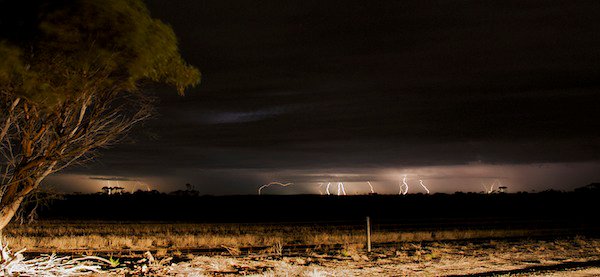
Storm Across the Great Southern
On a motorcycle ride across the continent from Perth to Sydney, the recurrent notion I had was that I was touring a country that had the charms of 1950s America and the technological benefits of the 21st century. There did not appear to be litter along any roadside and every community, regardless of its size, was freshly painted and neatly trimmed. The weeks I was in Oz may have been the longest I've gone in decades without seeing graffiti on buildings.
Norman Rockwell might have put on canvas idyllic towns like Esperance and Oyster Bay and Clare and Lorne. They seemed to me to reflect what has always been attractive about America but has since been lost in a crowd of people and buildings and traffic and franchised homogenization.
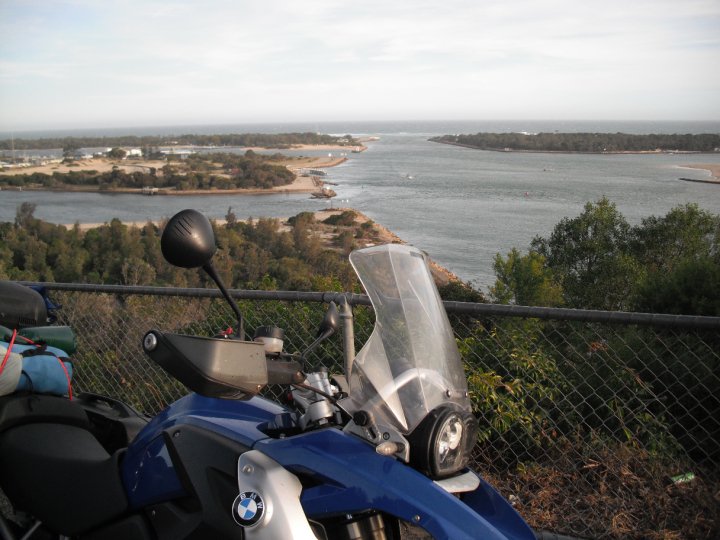
The lifestyle and much of the culture is connected by economic and emotional tissues to the landscape. Australians view the countryside and every horizon as communal property and when they are rolling across the Outback and see a track leading into the bush, they are comfortable turning and following it to a watering hole or a place to camp.
"No Trespassing" and "Trespassers Will Be Shot," which are common phrases posted on American property lines, are all but unknown down under. Even in the parkscape cities like Perth, which decorates a grassy rise between the mouth of the Swan River to the east and the Indian Ocean to the West, the highways out of town on weekends are busy with loaded Utes and caravans bound for the bush or the Karri forests or the Stirling Ranges or the Leeuwin Peninsula.
I spent my first night sleeping under the Southern Cross in a campground near the Leeuwin lighthouse on the rocky peninsula that separates the Indian from the Southern Ocean. Putting along the dirt track on the motorcycle after sundown with a tent and a bag and a computer and clothes I noticed the Aussies appeared to have settled in for the summer months of January and February close to the banks of the Blackwood River. Families had erected tents the size of small houses around fire pits and pickups and trailers were stacked with folding chairs, kayaks, barbecues, generators, cots, ice chests, and anything to sustain their long days under the southern sun. There was no loud music or pleading drunks. Instead, I heard the distant surf and the laughter of children playing in the lowering darkness and saw stars wheeling up from out toward the Nullarboor Plain.
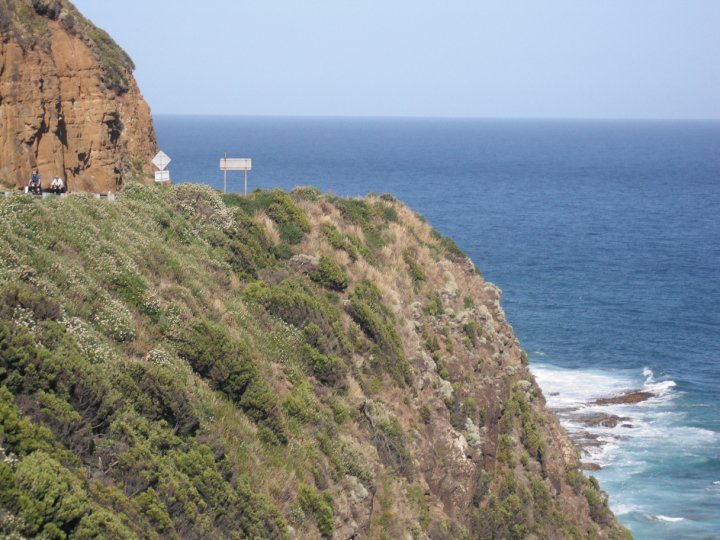
Lean Smart or Get Wet
The trip east along the southern tier of the Australian continent was rich with epic geography and botanical beauty. The road curling between giant Karri trees in the Margaret River Valley was a smooth tarmac enclosed by the tallest hardwoods growing on the planet and down near Esperance there were mountains rising up out of the ocean and inexpensive bungalows set along the palisades with views that might cost tens of millions in Malibu or Monterrey. I assumed this was what Southern California must have looked like before the arrival of the condo builders and the road pavers. Australia has more dirt track than sealed roadbed but riding it alone is a risky proposition. A mechanical malfunction or a minor accident could turn fatal because cell signals do not always reach the best places to ride.
The Nullarbor was afire in late January. Brush was burning and the winds were moving it southward. The famous 90-mile stretch of straight road lay ahead but this was Australian Independence Day and I had envisioned several cold, cleansing ales at an isolated roadhouse in the Outback. Unfortunately, there was only a gravel camp site and a sign on the showers that all snakes in the area were poisonous and that it was important to close the door to keep them from "slithering" into the bathrooms, and I had not even zipped up my tent. There were no beer-addled drunken blokes to sing "Waltzing Matilda" with and the pub featured cheap Formica and a vinyl floor with plastic chairs at wobbly tables. Oddly, near the front door, propped up on an easel, there sat a large plastic poster with graphic depictions of "The Spiders of Australia." I had a beer and then went back to check again that I had zipped up my tent.
Coming down off the Nullarboor, the proprietor of a petrol station introduced a baby kangaroo, a "Joey" that he had rescued while out cruising around in the bush with his four-wheeler. They are even stranger creatures when they are tiny. A hot wind followed the BMW down the Ayre Peninsula but there were oysters at Coffin Bay and by nightfall the next day bottles of local vintage wines were popped in the Clare Valley.
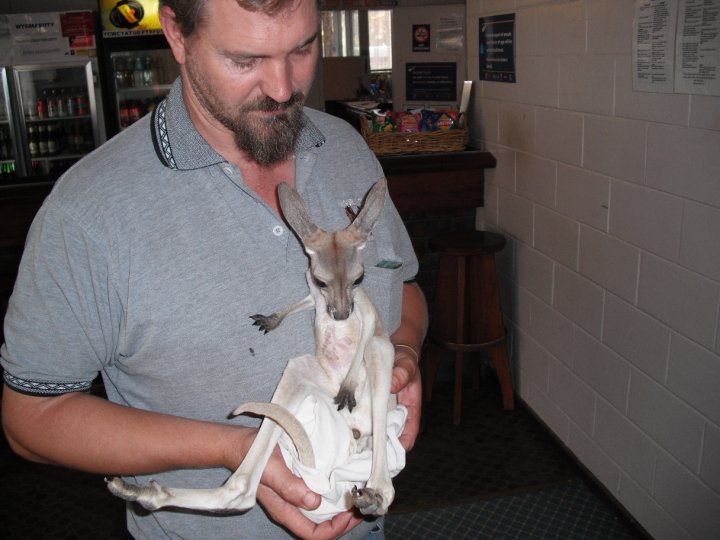
Little Lost Joey
Walking across the campground, I was greeted by a slender, gray-haired man with a bit of a limp.
"How's yer ride goin', yank?"
"How'd you know I was an American?"
"Ah, we know," he laughed. "Yer pretty easy to spot."
"It's great," I answered. "Might be the best place in the world to ride a motorcycle."
"Yep. Been ridin' all my life, too. How I banged up my knee."
"I noticed you were limping."
"Not real fond of our health care system, just now," he said. "I had a knee replacement and wanted to get the top doc in Sydney but he only practices at the private hospitals. Government won't pay the full bill except at public hospitals so the operation cost me some money."
"Some money? A lot?"
"Several hundred dollars."
I struggled hard not to laugh. He had gotten his knee replaced by his country's top orthopedic surgeon and had only spent hundreds. My inclination was to tell him about health care costs in the "land of the free," what he might have spent on insurance premiums and deductibles and Medicaid and Medicare taxes, but I enjoyed my time with him talking motorcycles and the summer he and his mates rode up the Gibb River Road deep into the Kimberley. What may be the world's largest and least explored national park, the Kimberley and a motorcycle and I have a date.
As I motored through the vineyards of the Baroosa Valley and down to the Limestone Coast, I began to wonder if the overwhelmingly pleasant disposition of the Australians I was meeting had something to do with their social contract. The country's minimum wage is $15.61, which is more than double the U.S. mandated wage rate, and no one is without health care. There is undoubtedly a calculation to be made on the impact this has on homelessness and substance abuse. Income tax rates for wage earners are also reasonable. Incomes ranging from $37,000 to $80,000 are taxed at a base rate of $4,650 plus 30 cents for each dollar over $37,000 for an effective tax rate of 12.6 - 21.9%. $80,000 to $180,000 in earnings is taxed with a base of $17,550 plus 37 cents for each dollar over $80,000 for a rate that ranges from 21.9 - 30.3 percent.
Marginal tax rates, of course, can be higher for various reasons but middle class families do not appear to carry an unfair burden, even with the 1.5% tax that pays for the national health care plan called Medicare. Perhaps, much of this has to do with an almost insignificant amount of spending on the military. The $27 billion dollars spent annually on Australia's defense is only 1.8 percent of the gross domestic product. In the U.S., which has considerably larger economy and population, defense spending still appears to consume too much of the nation's treasure. America expends 4.7 percent of its gross domestic product on guns and bombs and planes and elective wars, which is $711 billion dollars every year. China has the number two global military budget at only $143 billion. Books are easier to balance when you aren't buying a lot of guns.
Maybe Australia has figured out the recipe for a reasonable hybrid of capitalism and socialism. Their economy is booming now because of natural resource development in the northwest near the ecologically sensitive Kimberley region and mining and drilling and engineering companies are visiting cities like Houston to recruit young workers to forsake America for Oz. One trip along the Great Ocean Road on a motorcycle would create immigrants out of almost every Texas prospect. The Southern Ocean has spent eons eating away at the continental shelf and has left cliffs that rise above the surf by hundreds of feet. There are empty beaches below and in some coves it is possible to look down on sharks slipping between the giant rock formations cut by the sea. Waves of cold water coming all the way from Antarctica are eating away at Australia's southern coast and through the eons have left limestone stacks that have created a formation called the Twelve Apostles. The rock apostles stand in the water and form an eerily beautiful scene.
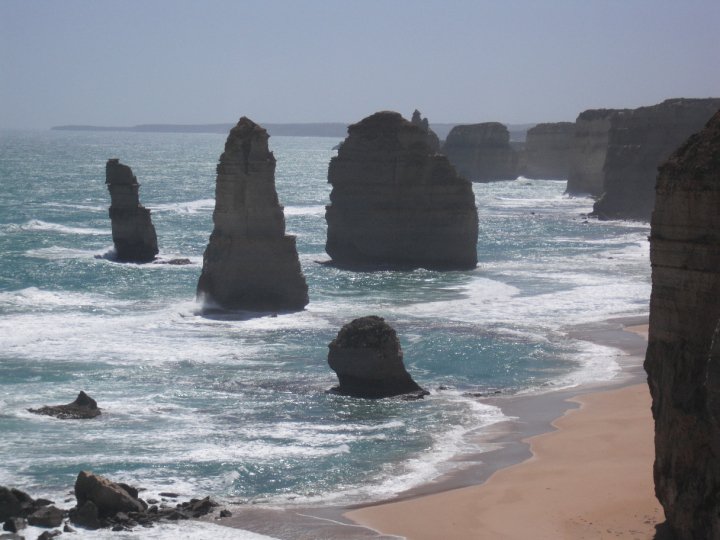
A Few of the Apostles
Renting a hotel room seemed an absurdity when the sky was so close and the air fresh and clean. My preference was to sleep on the ground for the entire 5000-mile journey. One night I awoke to an odd crunching sound and turned my head to see a tall 'roo bent over eating grass a few feet from my head in the Grampian Ranges. As alarmed as I was I still smiled when the moonlight on the animal's face lit up an expression that almost asked, "What the hell are you doin' here, yank?" I went back to sleep feeling guilty for having eaten a kangaroo steak earlier that evening.
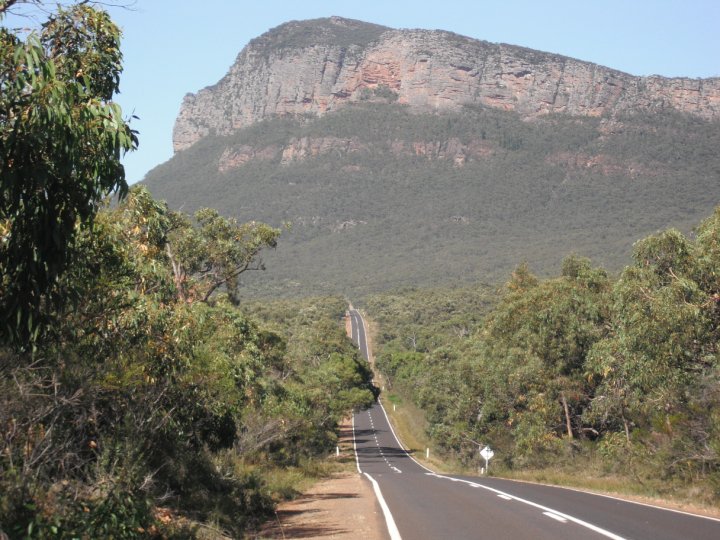
Morning in the Grampians
The recurrent warning for motorcyclists in Australia is not to rise and ride too early or keep rolling close to sundown. The 'roos start moving about and they can ruin a good motorbike. The great motor trains of tractor-trailers crossing the continent at night have gigantic steel bumpers up front to knock the displaced creatures out of the way without even slowing the truck's speed. There did not seem to be many 'roos along the great ocean road and the twisting tarmac that edged out next to the ocean and revealed improbable views around every turn. The plant life was windblown and the rocky soil seemed almost uninhabitable for animals.
By nightfall, there was a spot of drinking going on with a group of Aussies and some Czech immigrants on the beach outside Lorne. The ocean had a kind of unsettling loudness and I was barely able to hear the discussion between the Czech woman and her husband, which did not seem to be setting up a restful night of sleep ahead for the couple. The sand was soft, though, and the caravan park and the bridge across the river to a broad and empty beach were lovely and comforting. One of the most dependable characteristics of Australia that travelers encounter is the caravan park. Regardless of a town's size, there is a caravan park, (Americans call them campgrounds), and it's often in the prettiest part of the community. In Albany on the southern coast, I slept next to a river and in Lorne I camped with the ocean sounding through my sleep and in Lakes Entrance the next night on a windy hill beneath eucalyptus trees with 'roos loping past my tent.
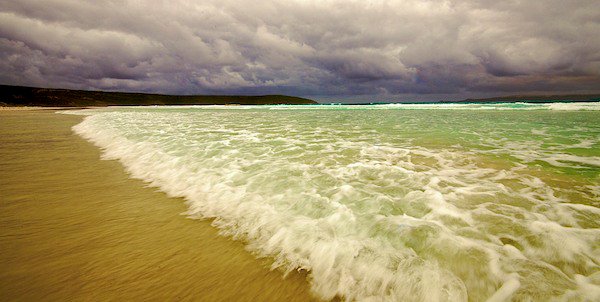
The Sounding Sea
Yes, I know, I've made Australia sound like utopia, but, of course, no such place exists on our little blue speck. Oz still struggles to find a way out of how it has treated its indigenous people, the aboriginals. As late as the early 70s, babies were being separated from their parents to be adopted and raised into the white culture. Wrongs are being undone but there seems no policy that is comprehensive enough to please all interests and the aboriginals do not readily choose the bush over the city, which suggests a sustaining wisdom for their culture. The U.S., of course, also has a bleak history of near genocide of Native Americans and our move toward civil rights has been a painful struggle that has not yet ended. These issues still confound both countries as Oz tries to manage Asian immigration and America talks about militarizing its frontier with Mexico to keep out undocumented border crossers. Observing from a distance, as with a lost love, I have been heartened that Australia's political discourse has not yet been riven with the destructive vitriol spewed by the two parties proselytizing on American cable television. The Aussies undoubtedly think their politics are infected and destructive but they have mostly not spent time in the U.S. watching our democracy's absurdities unfold at election time.
None of this was of any consideration as the motorbike was pointed toward a dirt track that ran up the Great Dividing Range between the Snowy Mountains and the Victorian Alps. The dirt route was narrow and the passage of two vehicles appeared impossible but two wheels were, as always, freedom. In more than 100 plus miles, only one other vehicle passed in the other direction and it was a forest service Ute. Along the edge of this track there were no guardrails and a missed turn, as altitude was acquired, meant a tumble of a few thousand meters. Uninhabited canyons split the mountain ranges and shimmering rivers reached out toward coastal horizons. There was no sign of humanity other than the dirt track that had been bladed and blasted into the mountainsides. The BMW purred and leaned and took to the roll as if it were enjoying the ride as much as I was, and the sun flickered through the trees as I realized I had finally taken a trip that I wished might never end.
But I am an outsider, a Yank, and went home to Texas. In retrospect now, I see Australia as a younger America. Great cities with global businesses, small startups with unknown potential, interesting food and art and architecture, (great writers like Tim Winton), and all the land and natural resources it might need to support its modest population. And yes, Australians might be able to make their country even greater. There are problems to be confronted. But it will be a mighty struggle for improvement. And I would suggest they not try too hard. Grab another VB and take a second look at the sunset.
Things are pretty damned good down under.
Special thanks to I. F. Duncan for "Sounding Sea" and "Storm Across the Great Southern" photos at http://www.wescapephotography.com Also published at http://www.moorethink.com